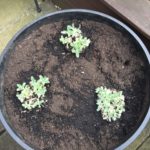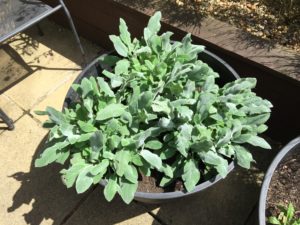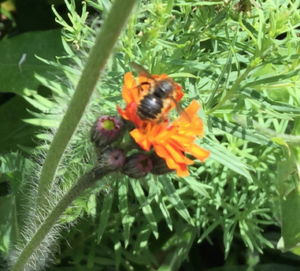In 2014 I wrote an article, How friendly are bee friendly plants from garden centres? Like many people when I buy plants I want them to be neonicotinoid free and therefore truly bee and pollinator friendly. My fears were borne out in some recent research (May 2017) by Prof. Dave Goulson
I recently bought several organic plants when visiting Caves Folly Nursery, a Soil Association accredited plant nursery, after meeting the owner Brigit, at the Blooms for Bees Bee Festival Ryton Organic Gardens last year. To buy on-line, she has a dedicated web site peatfreeplants.org.uk
Pioneering and Organic Nursery
Briget Evans, who supplies perennial plants from her nursery, mail order and wholesale to the National Trust, explains why and how Caves Folly became one of the first registered organic nursery businesses in the country.
Caves Folly Nurseries lie on the beautiful Herefordshire slopes of The Malvern Hills, surrounded by magnificent views and an abundance of wildlife. They have been growing containerised plants organically and in peat free compost for well over 25 years. She stated, “As far as I know we are one of only a handful of commercial producers of ornamental plants in the UK with a Soil Association certificate. Our specialities are perennials, grasses, herbs and alpines.”
“It is always a delight to share such beautiful surroundings and the abundance of flora and fauna with visitors to the nursery. So why are we so dedicated to growing organic? There are various reasons: environmental, personal, ethical and financial. From early in my horticultural career, I experienced the effects of chemicals on my health and that of my colleagues. Regular spraying made me only too aware of the toxicity not only of pesticides but also of plastics, solvents, paints, etc. on living organisms. I reached a turning point when I became ill after using an organophosphate chemical, which I had apparently absorbed through my skin. It was the deciding factor; the organic nursery was born. It all sounds idyllic and natural: no spraying – no chemicals in the compost. Marvellous.”
“However, when we first started there was little information about peat free compost for containerised stock. Organically grown plants? No one in ornamental horticulture had ever heard of that phenomenon. There were just glimmers of help from friends, books and lots of common sense. Finding an organic compost with the correct balance of nutrients for containerised plants proved remarkably difficult. Many years of experimentation has finally resulted in a substitute for standard peat-based compost. Our basic potting mix includes composted bark, coir, loam, vermiculite or perlite, depending upon the plants. Nutrient availability is a problem with organic compost. Because we don’t use slow-release fertilisers, our plants take longer to reach a mature size, even though their root system is of equal quality. As growers, you will appreciate that one or two weeks in the gardening season can be crucial. They are vital when you produce plants commercially.”
“The first two years of conversion were a struggle and our plant losses with above average. However, after this, there seemed to be a natural transition, and gradually balance was achieved. Suddenly, under every pot, beetles galore were chomping away at slugs and snails, frogs and toads were hopping about everywhere, with newts nestling in the undergrowth. The nursery even had a resident wren family in the greenhouse all ‘aphid duty’. The increased insect population attracted more birds and animals, completing the natural cycle.”
“Now the nursery is not a toxic, sterile environment, as many so often are nowadays. It is a living breathing example of how we can work with nature and at the same time, produce a commercially viable product. Our chief weapon against pests and diseases is constant vigilance: regular checking, good hygiene, removing dead and diseased foliage and slugs and snails. We use biological controls against vine weevil, sciarid fly (fungus gnats) and slugs. Aphids are usually dealt with by our friendly wildlife, although occasionally we spray with insecticidal soap solution. Weed control is achieved mainly by hand weeding. Bark chip and cocoa shell on the surface of larger pots and as border mulches are successful.”
“Why don’t all nurseries go organic? Successful organic growing has entailed many hours of tireless enthusiasm and heart break, as well as thrills and excitement. Now after all these years I can honestly say we have at last cracked it. We now supply thousands of plants to discerning customers at garden shows all over the country as well as to Ryton Organic Gardens shop and the National Trust.”
A strange thing happened, and while writing this on 7 June, I went outside to see what was flying around my garden and guess what..my 1st Wool carder bee of 2017 was foraging on Orange hawkbit…( Hieracium brunneocroceum) hopefully eager to use my organic Lamb’s ear!!
Caves Folly Organic Plants 01684 540631 Colwall, Worcestershire WR13 6DX
Buzz Club for Citizen Science pollinator projects
“All my articles and videos, available free, are funded by my teaching, presentations, sales of award winning bumblebee nest boxes, solitary bee boxes, and wormeries. Please help by spreading the word and forwarding this link to your friends and colleagues. https://nurturing-nature.co.uk Thank you” George Pilkington




This must be more widely known !
I have only just heard about this after filling my garden with “bee” friendly plants from garden centres.
Was so happy to have lots of bees …..now feel I should dig everything up ,
It is Linda, very annoying and you will not be the only person feeling this way. I did myself when I found out. Its only word of mouth, websites, news article etc., that can spread the word. Ask your garden centre or wherever you purchase. I have asked many and they mostly do not know, so I have decided to use known non-neonic suppliers.HTH, George
Hi I am so please to read this information as l run a new community gardening course for people with mental and physical health problems etc and have lots of local boarders to fill. Would normally have gone out to buy plants but now need to rethink what & how we will grow. Difficult on a very limited almost non existent budget! But l am not compromising. Wish me luck!!
Hi Jacqueline, grow flowers/plants from organic seeds? Cheers,George